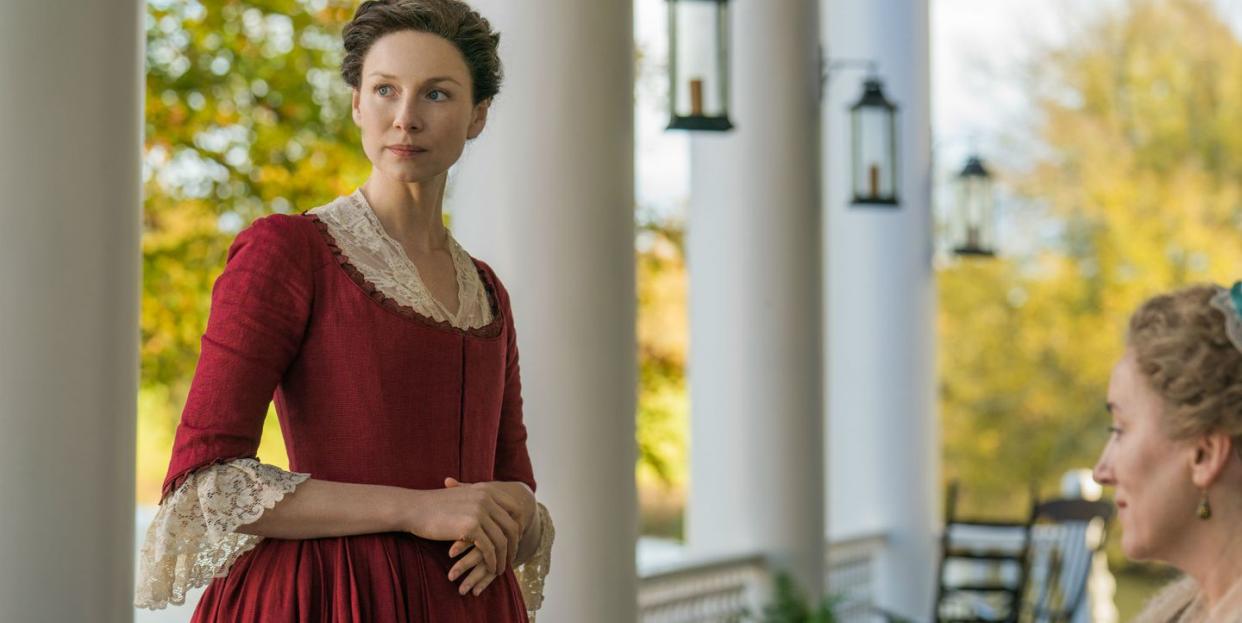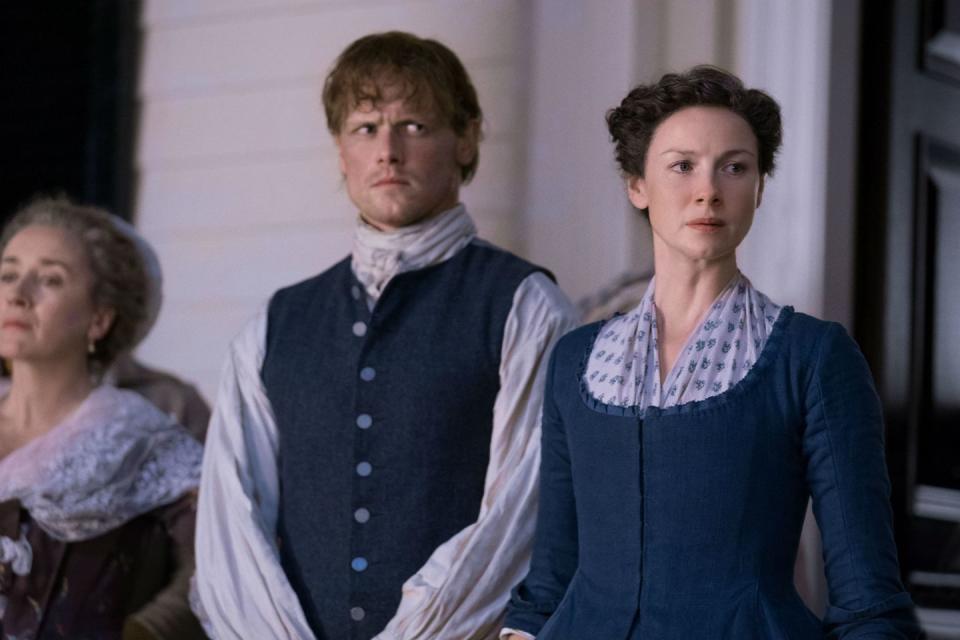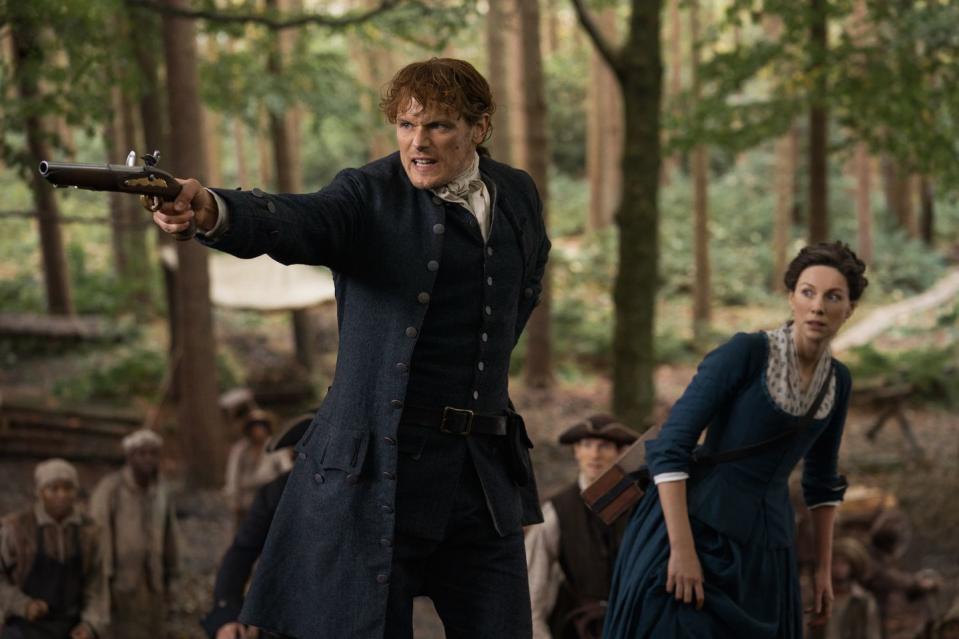Catriona Balfe Struggled With Outlander's "Jarring and Horrific" New Reality

The one thing that kept us all going through the Droughtlander were the promises that season 4, when it finally debuted, would find Jamie and Claire happier than ever before. And while that's so far proved true as far as their relationship goes, their decision to build a life together in colonial-era North Carolina makes them part of-and arguably complicit in-one of the ugliest chapters in American history.
Last night’s episode, "Do No Harm," saw Jamie bring Claire to the home of his Aunt Jocasta (Maria Doyle Kennedy), a plantation owner who’s eager to transfer ownership of her estate to Jamie. As a twentieth-century woman with years of life experience in both 1940s England and 1950s America, Claire can’t conceal her discomfort from Jocasta, who is the kind of slave owner who chooses to see herself as benevolent. Having been left essentially penniless by the boat robbery in the season premiere, the Frasers are short on options, and though neither will contemplate owning slaves, Jamie sees a chance for them to take over River Run and change it for the better. But things come to a sudden and tragic head when one of Jocasta’s slaves, Rufus, attacks a white overseer in self-defence and becomes the target of a mob calling for his execution.
Below, Catriona Balfe breaks down the key moments from "Do No Harm."
On Claire's conflict with Jocasta
Obviously as a woman coming from 1968-the height of the civil rights movement, where her best friend is Joe Abernathy-to then go back and see a slave plantation firsthand, it's such a jarring and horrific thing for Claire. It creates an instant gulf between her and Aunt Jocasta, and it’s something that Claire can’t quite get past, this notion where Jocasta sees herself as such a benevolent owner, but people are considered property in this time, which is such a horrific idea to Claire.
This is the one episode where we really see Claire allowing her emotions to override her logic, perhaps, or her rationality. We see that especially with Rufus, where she just is not able to take in the larger context of what she's doing and what her actions might cause, and that leads us to this really horrific moment when this mob is calling out for Rufus's body and so she does the only thing she thinks she can do, which is to give him a little grace and protect him from the horror of being torn apart by this mob.

On Jamie's brief, ill-fated plans for River Run
When they are offered stewardship of River Run, it's almost too brutal for Claire to even entertain, although this idea that they can become settlers and build this community from the ground up for themselves is quite a beautiful one. But the reality is that this land was not uninhabited for anyone to take. It does show you the realities of what America as we know it today, where it came from-and I think that was a really interesting thing for us to all explore. Especially not being an American, I wasn't so fully aware of all the intricacies of history, but this is how many Americans came to this country, and these are the kind of things they had to go through.
On Claire’s decision regarding Rufus' death
It was one of the plot points that we definitely struggled with, and there was a lot of conversations with the writers, but ultimately this was the way they wanted to tell her part of the story, and it ties to things that happened quite frequently in that time. Even though it's horrific, it made sense to the story that they were trying to tell about this particular moment in American history on a slave plantation. But it wasn't the easiest material to dive into.

On the contrast between Claire and Jamie's newfound happiness, and the reality of colonial-era North Carolina
It's funny when you get asked to talk in advance about the broad brush strokes of the season, and you're like, "Yeah, Jamie and Claire are so happy!" But once people actually see it, you can get into the nitty gritty, and of course it's not quite that easy. Especially at the beginning of the season, we're faced with a lot of these more brutal and horrific realities of life in the south in this time.
It's this push and pull, especially for Claire, of wanting to stay in America. Her desire to go back to Scotland is a lot less than Jamie's, because she has such an emotional pull to America: It's where she raised her daughter, it's where she lived for 20 years, so this land is now part of her blood. But that then makes her come face to face with things like what happened at River Run, or the reality that if you take land in America at this time, not only are you complicit to a brutal political regime, but you're taking land from the Native Americans and these are things that run very contradictory to Claire's beliefs. That's something we explore more as the season goes on.
Watch Outlander on STARZ Sundays at 8 P.M. ET.
('You Might Also Like',)

